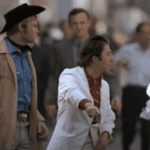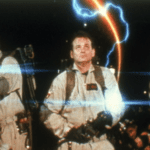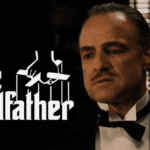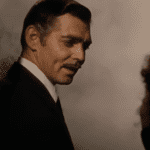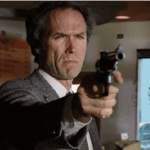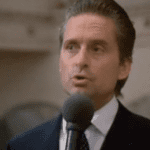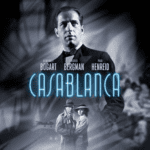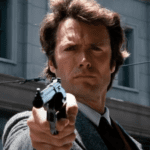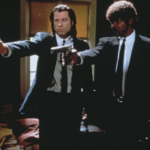Think you know movie quotes? Hold on tight because “You talkin’ to me?” might just be the most enigmatic of them all. Dive into a world where one phrase encapsulates societal angst and alienation with gripping intensity. Travis Bickle, played by the legendary Robert De Niro, interrogates not just his surroundings but his very existence.
Get ready to unravel the genius behind Martin Scorsese’s ‘Taxi Driver’, a film that paints New York City with the brush of neglect and turbulence. What makes Bickle’s outburst resound so powerfully even today? Let’s dive into the chaos and revelation of one of cinema’s most enduring lines.
Stay hooked, because the deeper meanings might just surprise you.
Taxi Driver: A Cinematic Snapshot of Society
In 1976, Martin Scorsese delivered ‘Taxi Driver’, a film that didn’t just tell a story but encapsulated an era. Imagine New York City’s gritty streets, bustling yet isolating. The setting? Perfectly apt for Travis Bickle, the Vietnam War vet distanced from reality. New York was a mirror showcasing societal tension, a place grim and raw, echoing isolation that Bickle, portrayed by De Niro, internalizes so profoundly.
Travis Bickle isn’t just a character; he’s an emblem of masculinity grappling with solitude and discontent. The city’s detachment becomes his, highlighted further by Scorsese’s masterful direction. The film strikes a nerve, resonating with a 1970s America replete with its own identity crises. The post-war blues mixed with rising crime rates and socio-political unrest forms the fabric of Bickle’s world.
Take this journey through Travis Bickle’s eyes—each frame a reflection, a critique, a challenge to the complacency of city life. As we explore, watch how ‘Taxi Driver’ addresses not only its era but also extends discussions crucial to understanding human detachment even today.
Understanding ‘You Talkin’ to Me?’
“You talkin’ to me?” These few words morph Travis Bickle’s isolation into defiance and reflect on a societal mirror. This quote is more than confrontational; it captures Bickle’s identity struggles and the chaos of his psyche. Set amidst the shadows of NYC, this line epitomizes confrontation and confusion.
Here’s where cinematic artistry shines: De Niro’s portrayal during this line—captured in intense close-ups and strategic lighting—exposes a whirlwind of emotions. Shadows frame Bickle, emphasizing his mental unrest. Through Bickle’s eyes, we glimpse a world unkind and threatening, affirming a need for combative interaction.
This line transcends its literal context, drawing us into Bickle’s headspace, where nuances of self-identity and societal rejection interplay, offering layers of existential inquiry. It’s not merely a monologue—it’s a vibrant dissection of the character’s tumultuous self-awareness.
The Cultural Journey of an Iconic Phrase
The legacy of ‘You talkin’ to me?’ stretches from the silver screen into cultural consciousness, becoming a shorthand for defiant challenge and identity exploration. This quote lives beyond ‘Taxi Driver’, surfacing across diverse media landscapes—from cartoons to music, echoing its significance.
Comedians exploit the line’s familiarity for laughs, and musicians weave it into their verses, amplifying its cultural resonance. It’s a nod to a shared pop culture knowledge, bridging generations in understanding a timeless struggle for individuality.

In a broader cinematic context, this phrase redefined character complexity. De Niro’s portrayal transitioned Hollywood toward nuanced interpretations of flawed antiheroes, initiating dialogue about identity and society that continues to influence storytelling frameworks today. This line laid foundational changes in the portrayal of human imperfection on screen.
Why Bickle’s Challenge Still Matters
Fast forward to today, where Bickle’s confrontational demand still speaks volumes. Amidst urban hustle, many still feel unseen, unrecognized by an indifferent world. Travis Bickle becomes a conduit to explore human interactions and emotional detachment in our digital age.
Conversations around mental health and societal neglect are more important than ever, and Bickle’s quest for connection highlights a universal theme. His aggression veils a desire for validation, a plea to be heard above the din.
So, as we navigate contemporary narratives, let Bickle’s line remind us: beneath aggression, the search for understanding prevails—a narrative thread woven tightly into the fabric of every human story.
- Why So Serious? – The Dark Knight
 Introduction to The Dark Knight and The Joker Ever wondered why a movie quote haunts us even years after its release? The Dark Knight offers lines so impactful they’ve etched themselves into pop culture, with none more famous than the Joker’s taunting query, “Why so serious?” Introduction to this cinematic marvel is almost unnecessary, but… Read more: Why So Serious? – The Dark Knight
Introduction to The Dark Knight and The Joker Ever wondered why a movie quote haunts us even years after its release? The Dark Knight offers lines so impactful they’ve etched themselves into pop culture, with none more famous than the Joker’s taunting query, “Why so serious?” Introduction to this cinematic marvel is almost unnecessary, but… Read more: Why So Serious? – The Dark Knight - “I’m Walking Here, I’m Walking Here” – Midnight Cowboy
 Ever feel like the world might just run you over if you don’t stand your ground? Imagine navigating the chaotic streets of NYC in the ’60s. Sounds intense, right? Well, that’s exactly what happens in the iconic scene from Midnight Cowboy where Dustin Hoffman’s character boldly claims his turf with ‘I’m walking here!’ What’s even… Read more: “I’m Walking Here, I’m Walking Here” – Midnight Cowboy
Ever feel like the world might just run you over if you don’t stand your ground? Imagine navigating the chaotic streets of NYC in the ’60s. Sounds intense, right? Well, that’s exactly what happens in the iconic scene from Midnight Cowboy where Dustin Hoffman’s character boldly claims his turf with ‘I’m walking here!’ What’s even… Read more: “I’m Walking Here, I’m Walking Here” – Midnight Cowboy - “I Love the Smell of Napalm in the Morning” – Apocalypse Now
 Imagine waking up at dawn, surrounded by thick jungle, the air heavy with tension. Then, boom! The unmistakable scent of sweeping devastation—napalm. It’s chaotic, surreal, and strangely, some say it’s beautiful. Sounds wild, right? That’s war in Apocalypse Now, friends. Ready to dive into the psyche behind one of cinema’s most enduring lines? It’s more… Read more: “I Love the Smell of Napalm in the Morning” – Apocalypse Now
Imagine waking up at dawn, surrounded by thick jungle, the air heavy with tension. Then, boom! The unmistakable scent of sweeping devastation—napalm. It’s chaotic, surreal, and strangely, some say it’s beautiful. Sounds wild, right? That’s war in Apocalypse Now, friends. Ready to dive into the psyche behind one of cinema’s most enduring lines? It’s more… Read more: “I Love the Smell of Napalm in the Morning” – Apocalypse Now - May The Force Be With You – Star Wars
 “May the Force Be With You” – An Iconic Star Wars Quote One of the most recognizable phrases in cinema history, “May the Force be with you,” has become synonymous with the Star Wars franchise. This simple yet powerful line encapsulates the essence of hope, guidance, and the struggle between good and evil. Recognised by The American Film Institute… Read more: May The Force Be With You – Star Wars
“May the Force Be With You” – An Iconic Star Wars Quote One of the most recognizable phrases in cinema history, “May the Force be with you,” has become synonymous with the Star Wars franchise. This simple yet powerful line encapsulates the essence of hope, guidance, and the struggle between good and evil. Recognised by The American Film Institute… Read more: May The Force Be With You – Star Wars - You Talkin’ To Me? – Taxi Driver – Robert De Niro
 Think you know movie quotes? Hold on tight because “You talkin’ to me?” might just be the most enigmatic of them all. Dive into a world where one phrase encapsulates societal angst and alienation with gripping intensity. Travis Bickle, played by the legendary Robert De Niro, interrogates not just his surroundings but his very existence.… Read more: You Talkin’ To Me? – Taxi Driver – Robert De Niro
Think you know movie quotes? Hold on tight because “You talkin’ to me?” might just be the most enigmatic of them all. Dive into a world where one phrase encapsulates societal angst and alienation with gripping intensity. Travis Bickle, played by the legendary Robert De Niro, interrogates not just his surroundings but his very existence.… Read more: You Talkin’ To Me? – Taxi Driver – Robert De Niro - “These Are Not the Droids You Are Looking For” – A Star Wars Quote
 Few movie quotes have transcended time and become as iconic as Obi-Wan Kenobi’s famous line, “These are not the droids you are looking for.” This phrase, uttered in Star Wars: Episode IV – A New Hope (1977), has cemented itself in pop culture history. Beyond its significance in the movie, the line has evolved into a metaphor for persuasion,… Read more: “These Are Not the Droids You Are Looking For” – A Star Wars Quote
Few movie quotes have transcended time and become as iconic as Obi-Wan Kenobi’s famous line, “These are not the droids you are looking for.” This phrase, uttered in Star Wars: Episode IV – A New Hope (1977), has cemented itself in pop culture history. Beyond its significance in the movie, the line has evolved into a metaphor for persuasion,… Read more: “These Are Not the Droids You Are Looking For” – A Star Wars Quote - Don’t Cross The Streams – Ghostbusters
 In the pantheon of movie quotes that have wormed their way into our collective consciousness, few have the staying power of “Don’t Cross The Streams” from the 1984 supernatural comedy classic, Ghostbusters. This seemingly innocuous phrase, uttered with deadpan seriousness by Harold Ramis’s Dr. Egon Spengler, has become more than just a line from a… Read more: Don’t Cross The Streams – Ghostbusters
In the pantheon of movie quotes that have wormed their way into our collective consciousness, few have the staying power of “Don’t Cross The Streams” from the 1984 supernatural comedy classic, Ghostbusters. This seemingly innocuous phrase, uttered with deadpan seriousness by Harold Ramis’s Dr. Egon Spengler, has become more than just a line from a… Read more: Don’t Cross The Streams – Ghostbusters - “I”m Gonna Make Him An Offer He Can’t Refuse” – The Godfather
 “I’m Gonna Make Him an Offer He Can’t Refuse” – The Godfather’s Timeless Quote and Its Cultural Legacy Few movie quotes in cinematic history have achieved the legendary status of “I’m gonna make him an offer he can’t refuse.” Uttered by Marlon Brando as Don Vito Corleone in The Godfather (1972), this line is more than just a clever… Read more: “I”m Gonna Make Him An Offer He Can’t Refuse” – The Godfather
“I’m Gonna Make Him an Offer He Can’t Refuse” – The Godfather’s Timeless Quote and Its Cultural Legacy Few movie quotes in cinematic history have achieved the legendary status of “I’m gonna make him an offer he can’t refuse.” Uttered by Marlon Brando as Don Vito Corleone in The Godfather (1972), this line is more than just a clever… Read more: “I”m Gonna Make Him An Offer He Can’t Refuse” – The Godfather - Frankly My Dear I Don’t Give A Damn – Gone With The Wind
 “Frankly, My Dear, I Don’t Give a Damn”: An Enduring Movie Quote and Its Cultural Impact Few movie quotes in cinematic history have stood the test of time like Rhett Butler’s famous line, “Frankly, my dear, I don’t give a damn,” from the 1939 classic Gone With the Wind. Delivered with cool indifference by Clark Gable in his… Read more: Frankly My Dear I Don’t Give A Damn – Gone With The Wind
“Frankly, My Dear, I Don’t Give a Damn”: An Enduring Movie Quote and Its Cultural Impact Few movie quotes in cinematic history have stood the test of time like Rhett Butler’s famous line, “Frankly, my dear, I don’t give a damn,” from the 1939 classic Gone With the Wind. Delivered with cool indifference by Clark Gable in his… Read more: Frankly My Dear I Don’t Give A Damn – Gone With The Wind - Dirty Harry – Go Ahead Make My Day – Sudden Impact
 The ‘Dirty Harry’ franchise, a cornerstone of American cinema, has captivated audiences since its inception in the early 1970s. This series primarily revolves around the resolute and gritty San Francisco police inspector, Harry Callahan, masterfully portrayed by Clint Eastwood. Callahan’s character is emblematic of a tough, no-nonsense cop wielding a .44 Magnum, known for his… Read more: Dirty Harry – Go Ahead Make My Day – Sudden Impact
The ‘Dirty Harry’ franchise, a cornerstone of American cinema, has captivated audiences since its inception in the early 1970s. This series primarily revolves around the resolute and gritty San Francisco police inspector, Harry Callahan, masterfully portrayed by Clint Eastwood. Callahan’s character is emblematic of a tough, no-nonsense cop wielding a .44 Magnum, known for his… Read more: Dirty Harry – Go Ahead Make My Day – Sudden Impact - Greed Is Good – Wall Street Movie Quote
 Released in 1987, the film Wall Street, directed by Oliver Stone, stands as a significant narrative within the landscape of American cinema, reflecting the zeitgeist of the era. Set against the backdrop of the bustling financial district of New York City, the film delves into the moral quandaries faced by those entrenched in the world… Read more: Greed Is Good – Wall Street Movie Quote
Released in 1987, the film Wall Street, directed by Oliver Stone, stands as a significant narrative within the landscape of American cinema, reflecting the zeitgeist of the era. Set against the backdrop of the bustling financial district of New York City, the film delves into the moral quandaries faced by those entrenched in the world… Read more: Greed Is Good – Wall Street Movie Quote - Casablanca Famous Movie Quotes
 Released in 1942, “Casablanca” remains one of the most critically acclaimed films in cinematic history. Directed by Michael Curtiz, the film stars iconic actors such as Humphrey Bogart and Ingrid Bergman, whose performances have captivated audiences for decades. Set against the backdrop of World War II, “Casablanca” combines elements of romance, sacrifice, and patriotism, making… Read more: Casablanca Famous Movie Quotes
Released in 1942, “Casablanca” remains one of the most critically acclaimed films in cinematic history. Directed by Michael Curtiz, the film stars iconic actors such as Humphrey Bogart and Ingrid Bergman, whose performances have captivated audiences for decades. Set against the backdrop of World War II, “Casablanca” combines elements of romance, sacrifice, and patriotism, making… Read more: Casablanca Famous Movie Quotes - Dirty Harry – Do You Feel Lucky Punk?
 The Dirty Harry film series, which began with the release of the first film in 1971, has become a significant cultural phenomenon in American cinema. Centered around the character of Harry Callahan, portrayed with remarkable intensity by Clint Eastwood, the series has captivated audiences with its exploration of complex themes such as justice, morality, and… Read more: Dirty Harry – Do You Feel Lucky Punk?
The Dirty Harry film series, which began with the release of the first film in 1971, has become a significant cultural phenomenon in American cinema. Centered around the character of Harry Callahan, portrayed with remarkable intensity by Clint Eastwood, the series has captivated audiences with its exploration of complex themes such as justice, morality, and… Read more: Dirty Harry – Do You Feel Lucky Punk? - Ezekiel 25:17 Pulp Fiction – Jules (Samuel L Jackson)
 Introduction to Pulp Fiction and Its Iconic Moments Quentin Tarantino’s film Pulp Fiction, released in 1994, is a landmark in modern cinema, renowned for its bold storytelling and unique narrative structure. The film intertwines several seemingly unrelated storylines that converge in unexpected ways, creating an intricate tapestry of characters and events that captivates audiences. Each… Read more: Ezekiel 25:17 Pulp Fiction – Jules (Samuel L Jackson)
Introduction to Pulp Fiction and Its Iconic Moments Quentin Tarantino’s film Pulp Fiction, released in 1994, is a landmark in modern cinema, renowned for its bold storytelling and unique narrative structure. The film intertwines several seemingly unrelated storylines that converge in unexpected ways, creating an intricate tapestry of characters and events that captivates audiences. Each… Read more: Ezekiel 25:17 Pulp Fiction – Jules (Samuel L Jackson) - You Can’t Handle The Truth – A Few Good Men
 A Few Good Men, a courtroom drama film, was released in 1992 and directed by Rob Reiner. The film is adapted from a play of the same name by Aaron Sorkin, who also penned the screenplay. It features a distinguished cast including Tom Cruise, Demi Moore, and Jack Nicholson, whose performances were pivotal in bringing… Read more: You Can’t Handle The Truth – A Few Good Men
A Few Good Men, a courtroom drama film, was released in 1992 and directed by Rob Reiner. The film is adapted from a play of the same name by Aaron Sorkin, who also penned the screenplay. It features a distinguished cast including Tom Cruise, Demi Moore, and Jack Nicholson, whose performances were pivotal in bringing… Read more: You Can’t Handle The Truth – A Few Good Men - Show Me The Money – Jerry Maguire
 The Origin of ‘Show Me the Money’ The phrase “Show Me The Money” originates from the 1996 film “Jerry Maguire,” directed by Cameron Crowe. Within the context of the movie, Jerry Maguire, portrayed by Tom Cruise, is a sports agent facing a career crisis. After experiencing a moral awakening, he strives to promote a more… Read more: Show Me The Money – Jerry Maguire
The Origin of ‘Show Me the Money’ The phrase “Show Me The Money” originates from the 1996 film “Jerry Maguire,” directed by Cameron Crowe. Within the context of the movie, Jerry Maguire, portrayed by Tom Cruise, is a sports agent facing a career crisis. After experiencing a moral awakening, he strives to promote a more… Read more: Show Me The Money – Jerry Maguire



